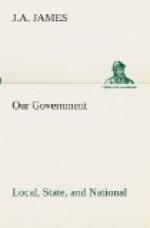The discovery of gold in 1860 at a point on the Clear Water River in northern Idaho was followed by a vast immigration to that section; this led to the discovery of gold in other parts of the territory, and soon the placer mines in the vicinity of Boise and other places were developed.
The territory of Idaho, comprising what is now Montana, Wyoming, and Idaho, was organized by the Federal Government, March 3, 1863, and Lewiston was made the temporary capital of the territory.
The placer mines of the Boise Basin proved richer than those of the north, and the bulk of the population rapidly drifted southward. This shifting of population caused the removal of the State capital to its present location at Boise in 1864.
By an act of Congress creating the territories of Montana and Wyoming, Idaho was reduced to its present boundaries in 1868.
On July 3, 1890, Idaho passed from a territorial form of government to that of a state, being the forty-third State to join the great Federal Union. Since that time her growth and development have been continuous and rapid.
Mining, lumbering, manufacturing, and agricultural pursuits are the principal resources of the State.
FORM OF GOVERNMENT.
The Constitution of the State of Idaho, like those of the other states in the Union, is modeled after the Constitution of the United States. It contains:
A Preamble, setting forth the purposes of the Constitution.
A Declaration, called the Bill of Rights, containing twenty-one sections.
Provision for dividing the powers of government into three departments.
Articles relating to taxation, suffrage, public schools, corporations, militia, immigration, labor, amendments, and other public affairs.
Preamble.—“We, the people of the State of Idaho, grateful to Almighty God for our freedom, to secure its blessings and promote our common welfare, do establish this constitution.”
Declaration of Rights.—The Bill of Rights is a declaration of privileges retained by the people, which the departments of government are expressly prohibited from invading. The most important provisions in the Bill of Rights may be classed under the following headings: democratic principles; personal security; private property; freedom of religion, speech, and of the press; and security against military tyranny.
Democratic Principles.—All men are equal before the law, and are protected in the enjoyment of life, property, and the pursuit of happiness.
All power is inherent in the people.
Personal Security.—The people have the right to bear arms for their safety and defense, but this privilege is regulated by appropriate legislation.
The people shall be secure in their persons, houses, papers, and other possessions against unreasonable searches and seizures.
There shall be no imprisonment for debt except in cases of fraud.




